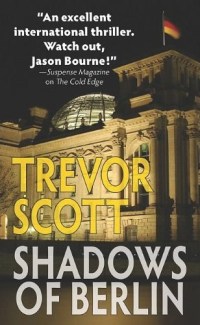Children of Paranoia by Trevor Shane
 Wednesday, December 21, 2011 at 6:40AM
Wednesday, December 21, 2011 at 6:40AM 
Published by Dutton on September 8, 2011
Children of Paranoia begins with a murder: an efficient strangulation. We soon learn that Joe, the murderer, is a professional killer, part of a group of assassins who carried out a series of murders that same day. Their motivation, revealed in an early chapter, is linked to the novel's premise: a clandestine war is afoot, waged by participants who begin training at sixteen and begin killing at eighteen (unless they are assigned to be intelligence officers or breeders). Trevor Shane is less quick to explain the war's purpose, why it started and what the two sides represent. Joe doesn't know. He simply believes he's one of the good guys and that the world will be a better place when all the bad guys are dead.
The war seems like one of those Hatfield-McCoy style feuds that has lasted for so many generations nobody can recall why it started. The beauty of this story lies in the uncertainty: Why is this war being waged? Are the bad guys really bad, the good guys really good? When two people on different sides happen to be friends, neither of them aware that the other is involved in the war, should their status as soldiers overcome their friendship?
The story of a professional killer in an unlikely war eventually intermingles with an even less likely love story as Joe meets the woman of his dreams while stalking his latest target. Most of the book, in fact, is written in the form of a letter (a very long letter) to the woman Joe loves (a technique that is ultimately flawed, since Joe ends up giving his lover detailed accounts of events she experienced firsthand). Due to a bizarre rule that binds the war's combatants, that relationship eventually causes a problem for Joe. While the rule and the problem create the dramatic conflict that drives the second half of the story, I have trouble making any sense of the rule. My inability to suspend disbelief ultimately made it difficult to remain engrossed in the novel. More troubling is that the story's second half tends toward melodrama. It sometimes has the feel of a made-for-TV-movie; at other times it seems like a cheesier version of Logan's Run. The second half is redeemed, however, by a strong ending that truly surprised me.
Putting aside my reservations about plot development in its second half, I consider the novel as a whole to be a worthwhile read. Shane writes in a compelling style, deftly mixing scenes of death with images of ordinary life, creating sympathy for those fighting on both sides of the war. His point, I think, is made rather explicitly when one of the soldiers comments about fighting in three wars -- Korea, Vietnam, and this one -- and complains that he was lied to each time about the threat posed to the "good guys" by the "evil enemy."
I don't know that the premise underlying Children of Paranoia merits a trilogy but it isn't fair to judge books I haven't read; they might turn out to be stellar, and this one sets up the next one quite nicely. Children of Paranoia showed enough promise that I am mildly interested in reading the next one, if only to find out whether Shane can concoct a plausible explanation for the secret war.
RECOMMENDED



